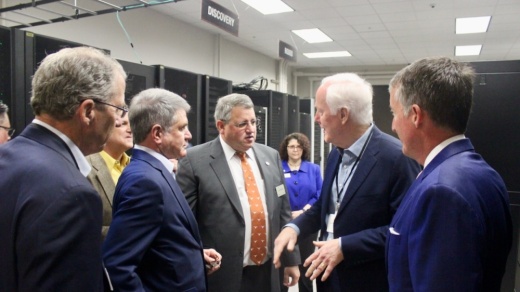The Austin area is home to the plants or offices of several major players in the technology space, including AMD, Applied Materials, Micron, NXP and Samsung—some of which already have multibillion-dollar expansions in the works. Representatives from those companies joined U.S. Sen. John Cornyn, R-Texas, and U.S. Rep Michael McCaul, R-Austin, April 18 at The University of Texas' research campus for a discussion of the industry's local presence and national efforts to boost America's semiconductor expertise.
While UT is already home to semiconductor facilities and related educational opportunities, officials said a related piece of federal legislation could boost the university's work even more while also driving larger investments in Texas. The CHIPS for America Act, sponsored by Cornyn in the U.S. Senate and McCaul in the House, would broaden the government's focus on semiconductors with billions more for research and collaborations in the field.
UT is in line to benefit if the bill is passed. The Texas Institute for Electronics, a partnership of dozens of companies and educational institutions, including UT, could receive a large slice of the act's $13 billion investment in research and development—including up to $3 billion dedicated to new or expanded semiconductor facilities.
The Texas congress members said this week that a need for more semiconductor production in the U.S. ranges from the smaller scale of personal electronics to national concerns related to research and security. Given the local industry presence already, further investment from the private sector in addition to the provisions of the CHIPS Act could set up Central Texas as a key contributor going forward.
“This bill has allotted $13 billion for research and development that could come to Texas. This is a regional conflict here. We’re fighting against New York and California, but with all the academic institutions we have here and the universities, the high-tech, I think Austin’s becoming the center, and the No. 1 high-tech center," McCaul said. "It makes a lot of sense to me for this center to be here. We authorized in the law the semiconductor technology center; we fund it in this bill, and we’re looking forward to getting this across the finish line.”

While awaiting the bill's fate, officials said they are ready to support UT's role in what Chancellor James Milliken called a "national imperative." Work could include updates at UT's Northwest Austin Pickle Campus fabs and modernization of its Montopolis campus to the south, UT Austin President Jay Hartzell told Community Impact Newspaper. Most importantly, Hartzell said, is the ability to train more workers for the growing sector.
"Part of the university’s role is to be one of the magnets where we bring talent in. And this effort will be resources and publicity, and give us a rallying cry to help people want to come to the university," he said. "But a large part of the partnership—why we’re working with companies like this—is because they can help inform us [of] what kind of talent do they want? What kind of training do they really need? ... What we hear from our industry partners is a need for talent across the spectrum."
And for now, industry members said they remain interested in the Austin area's offerings.
“In many ways, Austin is the heartbeat of innovation for our company," said Om Nalamasu, a vice president and chief technology officer at Applied Materials.





